|
|
|
Sort Order |
|
|
|
Items / Page
|
|
|
|
|
|
|
| Srl | Item |
| 1 |
ID:
096839


|
|
|
|
|
| Publication |
2010.
|
| Summary/Abstract |
This paper employs a historical approach to challenge the widely held notion that Chile does not have an 'Indian problem', or any kind of multinational diversity within its borders. It will examine aspects of Chile's recent past from the perspective of the Mapuche people. Its purpose is twofold: to add a new voice to narratives about more recent Chilean history, and to outline the emergence of a new identity politics. Focusing particularly on issues of land and political strategy, the oral testimony of Mapuche activists, some recorded by the author, will add another perspective to the much analysed trajectory of late-twentieth century Chilean politics, from failed socialist experiment and subsequent military dictatorship to slow redemocratisation. For the Mapuche, the period represents a move away from cooperation with mainstream political organisations to gain concessions from the state, toward a more ethno-centric discourse of territorial autonomy.
|
|
|
|
|
|
|
|
|
|
|
|
|
|
|
|
| 2 |
ID:
096842
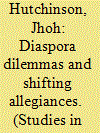

|
|
|
|
|
| Publication |
2010.
|
| Summary/Abstract |
Focused on the London Irish, this article discusses the diasporic dilemmas of Irish Catholics in England who oscillated between four claims to loyalty in the early twentieth century. Liberals and later the labour movement sought to mobilise them for radical political and socialist goals; the Catholic Church to support religious education against secularist threats; a homeland nationalism to advance the prospects of Irish parliamentary autonomy; and a diasporic nationalism to defend their ethnic interests in England. These pressures peaked during the First World War and the Irish War of Independence. The overall effect of this nationalist mobilisation may have been to advance their integration into English social and political institutions.
|
|
|
|
|
|
|
|
|
|
|
|
|
|
|
|
| 3 |
ID:
096843
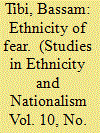

|
|
|
|
|
| Publication |
2010.
|
| Summary/Abstract |
This feature article acknowledges the fact that neither Islam, understood as the umma community, nor the modern civic European nations, are ethnic identities. Why then are both related to the notion of 'ethnicity' in the present article? Why does the analysis of the Muslim diaspora in Europe prompt an alert of an 'ethnicity of fear'? In order to answer these questions the analysis departs from the supposition of an ongoing ethnicization process that results in an ethnic conflict. The question and the supposition furnish the subject matter of the present study.
|
|
|
|
|
|
|
|
|
|
|
|
|
|
|
|
| 4 |
ID:
096837
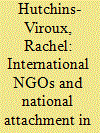

|
|
|
|
|
| Publication |
2010.
|
| Summary/Abstract |
This article evaluates the evolution of Americans' sense of solidarity, community, and identity in the age of globalisation through an examination of their involvement with non-governmental organisations (NGOs) and social movements active in the developing world. This analysis draws on Jürgen Habermas' contention that, in this age of an increasingly global and inequitable economy, civil society organisations that extend beyond national borders are more likely than other institutions to engender transnational solidarity. The article focuses primarily on results of an opinion survey conducted by the author, examining to what extent U.S. volunteers for international NGOs exhibit national or transnational senses of belonging. Conclusions include the ideas that this cosmopolitan population may indicate an emerging trend in greater feelings of solidarity with and attachment to developing countries, leading to increased support for more multilateral decision-making. However, this more global consciousness seems unlikely to replace feelings of national attachment and belonging.
|
|
|
|
|
|
|
|
|
|
|
|
|
|
|
|
| 5 |
ID:
096836


|
|
|
| 6 |
ID:
096840
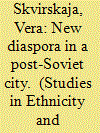

|
|
|
|
|
| Publication |
2010.
|
| Summary/Abstract |
Situated in Ukraine, post-Soviet Odesa has experienced emigration of its ethnic minorities (Jews, Greeks, Germans), seeing them replaced by Slav newcomers, transnational migrants, traders, and refugees. This migration pattern provides an opportunity to reflect critically on scholarly ideas of 'new diaspora', understood as vibrant cultural mixing. Drawing on Appadurai's notion of 'translocality' and focusing on Soviet generations of Odesans, I argue that some urban residents see themselves as having been transformed into a new diasporic community in their own city. This is due to a particular post-Soviet combination of factors: they have been confronted by demands of the nation-state, their social circle has emigrated, and new engagements have been 'blocked' by a form of tolerance marked by indifference.
|
|
|
|
|
|
|
|
|
|
|
|
|
|
|
|
| 7 |
ID:
096841
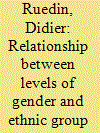

|
|
|
|
|
| Publication |
2010.
|
| Summary/Abstract |
This article examines the relationship between levels of gender representation and levels of ethnic group representation in national parliaments. Taagepera (1994) and Lijphart (1999) predicted that because of shared mechanisms and covariates levels of representation in the two forms should be positively correlated. Whilst this paper can identify a number of shared covariates, there is no evidence of an association between levels of gender and ethnic group representation. The lack of negative association suggests that increasing levels of representation in one form does not necessarily come at the cost of the other. Instead it appears that the salience and politicisation of divisions - approximated by the make-up of society - may shape the relationship between levels of gender and ethnic group representation: representation scores tend to be higher in the forms of representation that are thought to be more salient.
|
|
|
|
|
|
|
|
|
|
|
|
|
|
|
|
| 8 |
ID:
096838


|
|
|
|
|
| Publication |
2010.
|
| Summary/Abstract |
Second generation Australians from a Muslim background have appeared on the political radar recently as a group at risk of disengagement due to their potentially split allegiances. For these young Australians, the traditional tension over diasporic allegiances between the homeland and the country in which they live is further complicated by religious identity. This paper offers two case studies of the second generation of two mainly Islamic, but otherwise very different, ethnonational communities in Australia, Turkish and Iranian. It examines the responses of these groups to the rising essentialisation and ethnicisation of Islam, at the expense of ethnic and sociocultural difference. In particular, the paper focuses on the way secular practice and religious identity converge into 'cultural Islam'. We use the term cultural Islam as a way of describing those, particularly of the second and third generations in Australia, who proudly claim their Islamic heritage while choosing not to participate actively in religious life.
|
|
|
|
|
|
|
|
|
|
|
|
|
|
|
|
|
|
|
|
|